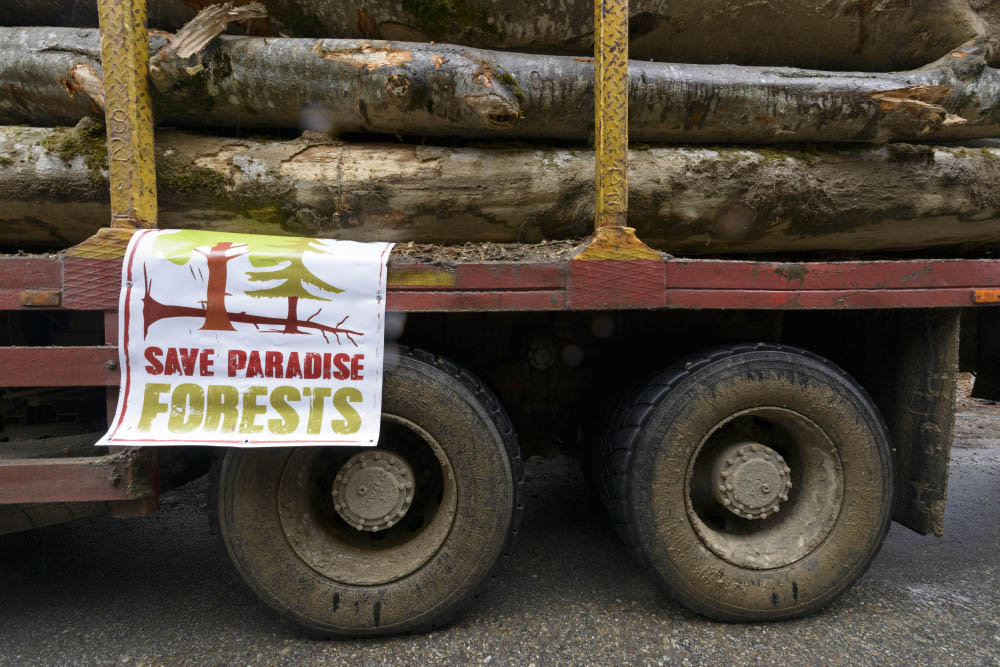Members of the European Parliament have to prevent forest destruction for bioenergy profits
On 17th of January 2018 the European Parliament will vote on a law proposal promoting renewable energy in the period from 2021 to 2030. This is a crucial vote that will have an impact on the future direction of critical climate action and on the essential protection of the world’s precious forests. It is targeted as a key measure to meet EU’s climate goals. However, the logging and agriculture industry have been heavily lobbying the EU Commission to introduce their commercial interests at the core of the EU’s climate agenda. They claim that biomass is a renewable energy source which is carbon-dioxide neutral.
To the contrary, there is strong evidence that burning whole trees and food crops is not climate friendly and not sustainable. The increasing EU demand for biomass as an energy source is driving forward large scale destruction of old growth forests both inside and outside the EU, making climate change worse and compromising efforts to ensure the essential transition to truly renewable and climate friendly resources.
Old growth and primeval forests store large amounts of carbon in biomass and soil through the absorption of carbon-dioxide from the atmosphere, often over centuries, if not thousands of years. When they are logged and the trees are burned, enormous amounts of dangerous carbon-dioxide emissions are released into the atmosphere. It will take centuries until the same amount of carbon will be stored in those forests again. So carbon neutrality only occurs in far future, well beyond the timeframe needed to meet our current emissions reduction commitments. This “climate therapy“ ends up being worse than the disease…
As a result of the hunger for bioenergy rainforests in tropical countries including in Indonesia are being destroyed at a breathtaking pace. But tropical forests are not the only forests under threat. In North America, Russia, Australia and Europe, where the biomass demand is increasing, carbon rich old growth and primeval forests are being eradicated along with their irreplaceable biodiversity.
In Europe, most old growth forests have been destroyed and only a fraction of what remains is protected. Logging, in particular for bioenergy, is a major threat to our last “paradise forests”. Most of them are located in Romania, Ukraine, Bulgaria, Slovakia, Scandinavia and Russia. In all those countries, logging, both legal and illegal, is killing millions of old trees every year.
Besides logging, bioenergy is equally a problem when food crops, such as palm oil or rapeseed, are used to produce biofuels for cars and trucks. Indigenous communities, including in the Amazon are under existential pressure from palm oil plantations. They are being dispossessed of their ancestral forests and land. According to the NGO “Transport and Environment“ the Peruvian government has announced that it has the capacity to dedicate at least 1.5 million hectares of land to palm oil cultivation to meet rising global demand.
Burning solid biomass also has negative effects on air quality, as the FERN-report “Covered in smoke” highlights. Unfortunately the debate about this threat has been ignored by the European Commission in revising the EU’s renewable energy policy. New research for Fern by Dr Mike Holland, a leading independent air pollution expert, reveals the perilous effects on EU citizens’ health from burning solid biomass such as trees, as FERN explains in their report.
The research indicates that potentially tens of thousands of EU citizens are dying prematurely every year as a result of exposure to air pollution from burning biomass. There are also severe health impacts such as cancer, cardiac and respiratory complaints, asthma attacks and working days lost to ill health. According to FERN, Dr Holland has conducted an assessment of 27 biomass burning power plants in the EU. The analyses of Dr Holland shows that “more than 1,300 people are dying prematurely each year as a result of exposure to air pollution from the 27 facilities considered“.
“Given the drastic effect that biomass burning is already having on citizens’ health – as well as on forests and climate – the Parliament must abandon its current path, specifically by ending support for converting coal installations into biomass ones, and for burning biomass in large-scale inefficient installations. Only then will the EU have a renewable energy policy that respects the environment as well as its citizens’ health“, Linde Zuidema, bioenergy campaigner at FERN, concludes.
More than 600 scientists signed a letter recently, urging “European legislators to amend the present directive to restrict eligible forest biomass to appropriately defined residues and wastes because the fates of much of the world’s forests and the climate are literally at stake“. In that letter they state: “The flaw in the directive lies in provisions that would let countries, power plants and factories claim credit toward renewable energy targets for deliberately cutting down trees to burn them for energy. The solution should be to restrict the forest biomass eligible under the directive to residues and wastes. (…) By 1850, the use of wood for bioenergy helped drive the near deforestation of western Europe even when Europeans consumed far less energy than they do today. Although coal helped to save the forests of Europe, the solution to replacing coal is not to go back to burning forests, but instead to replace fossil fuels with low carbon sources, such as solar and wind.“
Furthermore, 30 NGOs called on the European Parliament to support crucial changes to the proposed rules on bioenergy in the European Union’s Renewable Energy Directive.
On the 17th of January, Members of the European Parliament have a unique opportunity to halt unsustainable bioenergy use, and encourage only truly renewable energy sources such as wind and solar. “Transport and Environment” runs a petition where EU citizens can send a clear message to their MEPs that they don’t want their transport fuel, heat or electricity to be produced with bioenergy from harmful sources.
Video by FERN on CO2-emissions from bioenergy:


